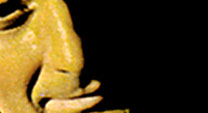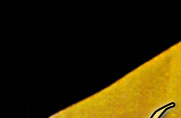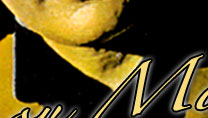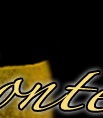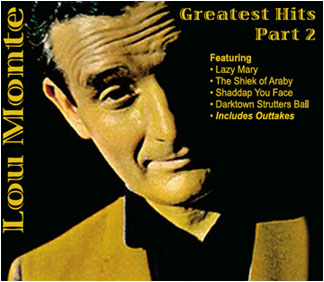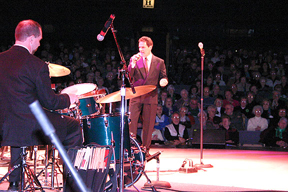|
Lou Monte
Lou Monte, an Italian-American of Calabrian heritage,
was born as Louis Scaglione on April 2, 1917 in Manhattan, New York.
He played the guitar and started singing as a child beginning his
professional career as a singer, comedian, and musician as a young
man just prior to World War II. After a stretch in the military,
Monte settled in Lyndhurst, New Jersey and his first rea1 break
came when he had a radio show in Newark, New Jersey. Eventually,
Monte was given a television program on that same popular station,
WAAT.
As June Bundy notes, “although Lou had been
singing professionally for fifteen years, it wasn’t until
he recorded an Italian-English version of “Darktown Strutter’s
Ball” at the end of 1953, that he hit the big time.”
After that, his records, both comedic and not, sold in the millions.
He appeared regularly at many famous nightclubs and, unlike most
Italian-American comedians of the era, he was seen frequently on
national T.V. At the pinnacle of his popularity, he was promoted
in various press releases as “The Godfather of Italian Humor”
and “The King of Italian-American Music.” Lou Monte
died in Pompano Beach, Florida in June of 1989.
The medium of most of Lou Monte’s comedy
is song, although his extensive and impressive night club act also
contained a good deal of stand- up. Many of his songs were sung,
and nightclub acts performed, in English with a liberal interspersing
of Italian dialect (of Neapolitan and Calabrian). As one commentator
has noted, “He translates American music into Italian and
Italian music into English.” As was stated in a past nightclub
review, Monte’s “songalog is heavily laden with pizza
pieces, including Italo verses of his American numbers with emphasis
generally on comedy tunes.” Monte’s appeal to the Italian-American
audience can be understood in both emotiona1 and socia1 terms. Emotionally,
his humor provided some Italian Americans with a sense of comfort,
of one-upmanship, or the sense of being a part of an inside joke,
and, socially, of having a slice of their world recognized by others.
His appeal to other ethnic groups was based upon their perception
that his humor related to their own experiences in associating to
American society.
An important theme in Monte's Italian-American
humor is his tendency to Italian-Americanize American history and
life. Such a technique served this marginal ethnic group by making
it feel a part of America’s early historical development.
It also served to heighten a sense of in-group solidarity by the
ludicrous layering of Italianicity on things supposedly rock-solid
Anglo-Saxon. In one song, he asks the question, "What did Washington
say when crossing the Delaware?” The answer: “Fa un’fridd!
(It’s cold!).” This bit is a take-off on a joke which
was popular in the Italian- American community, although Monte sanitized
the coarser punch line.” In this way, he played to the Italian-American
audience, knowing its members would enjoy and relate to the reference.”
In another example, according to Monte, the name of Paul Revere’s
horse was Baccigallup. The hit song, “Please Mr. Columbus”
offers yet another of Monte’s unique historical interpretations.
Lou Monte became famous for his so-called novelty
songs such as “Dominick The Donkey,” “Pepino U
Soriciello” (The Italian Mouse), “Italian Cowboy Song,”
“Italian Jingle Bells,” and ”Lazy Mary”
(C’Era Luna, Mezza Mare).” Like most Italian-American
comedians, Monte’s humor dealt with the common themes of marriage,
courtship, sexual relationships, and food. In his food song, “My
Rosina – The Menu Song,” the lyrics include: “She
is so good looking when she is cooking, what a beautiful sight among
the pots and pans.” In collaboration with Ray Allen, Monte
wrote, “Who Stole My Provolone?” (sung to the tune of
“Hang Down Your Head Tom Dooley”) a song parody, making
use of the double entendre.
Lou Monte’s strongest appea1 was to a broad
spectrum ranging from working class to professional middle-class
Italian Americans. Although Monte’s audience was varied, for
the most part it precluded the Italian immigrant, for whom the humor
was too Americanized and the very modern, assimilated Italian-American
for whom the humor was too greenhornish.
Lou Monte effectively utilized a wide spectrum
of vehicles and technologies in his show business career. He performed
his nightclub act in such major locations as Chicago, Las Vegas,
and New York City. In addition to his first significant radio show
on station WAAT of Newark, New Jersey, Monte also performed on popular
radio programs as a guest star.
Unlike most Italian-American comedians of his
time, Lou Monte received much national television exposure on such
programs as the Perry Como Show and The Ernie Kovacs Show. Monte’s
records sold in the millions. As a matter of fact, Reprise records
had its first smash hit with Monte’s “Peppino The Italian
Mouse” recording. Monte also made appearances at prominent
feasts and festivals and had a role in the comedy hit film, “Robin
and the Seven Hoods” (1964).
Lou Monte’s participation in the Italian-American
comedic circuit diminished by the1950s, as his career hit stride.
In our revolutionary schema, Monte stands, roughly, half-way between
the immigrant comedic experience and the modernized entertainment
world with its national television, cable T.V., home videos, national
marketing strategies, and perhaps, international forms of communication.
|





